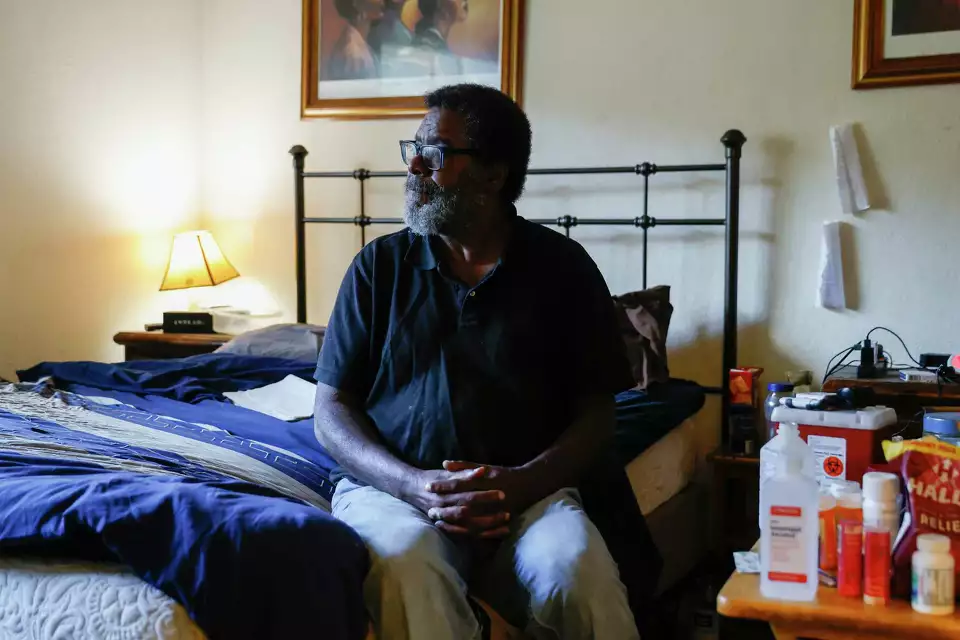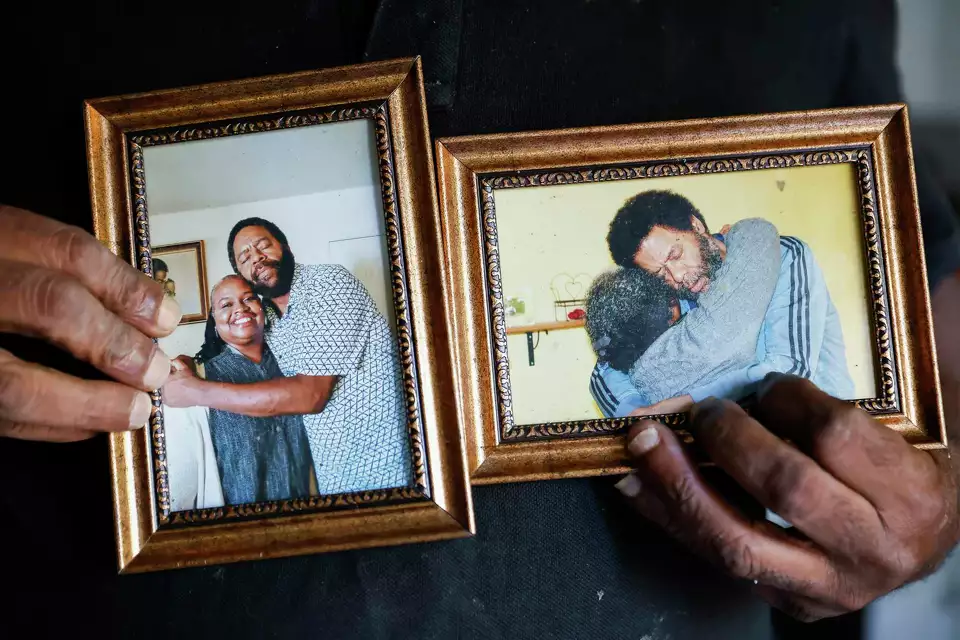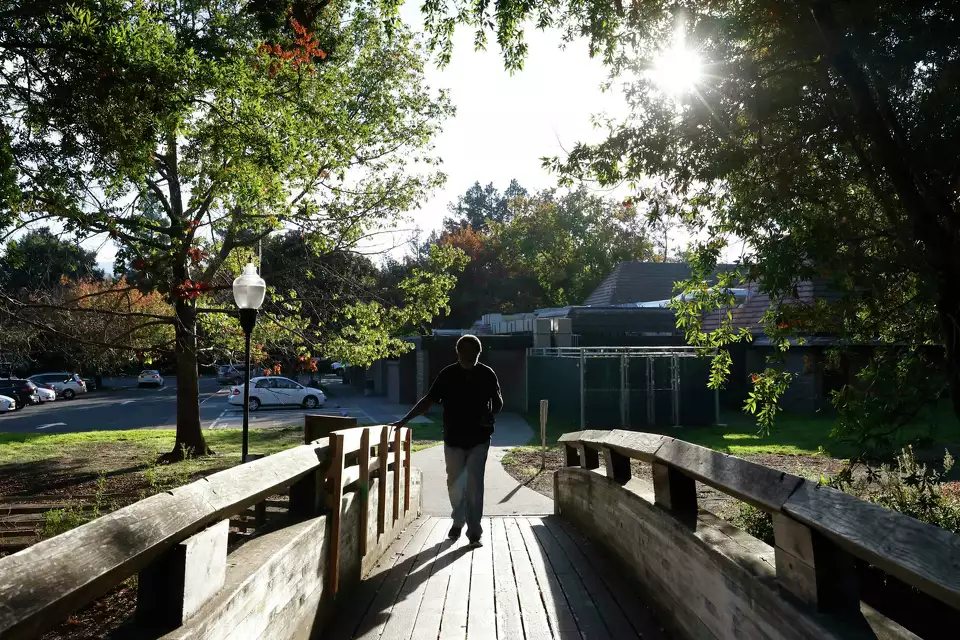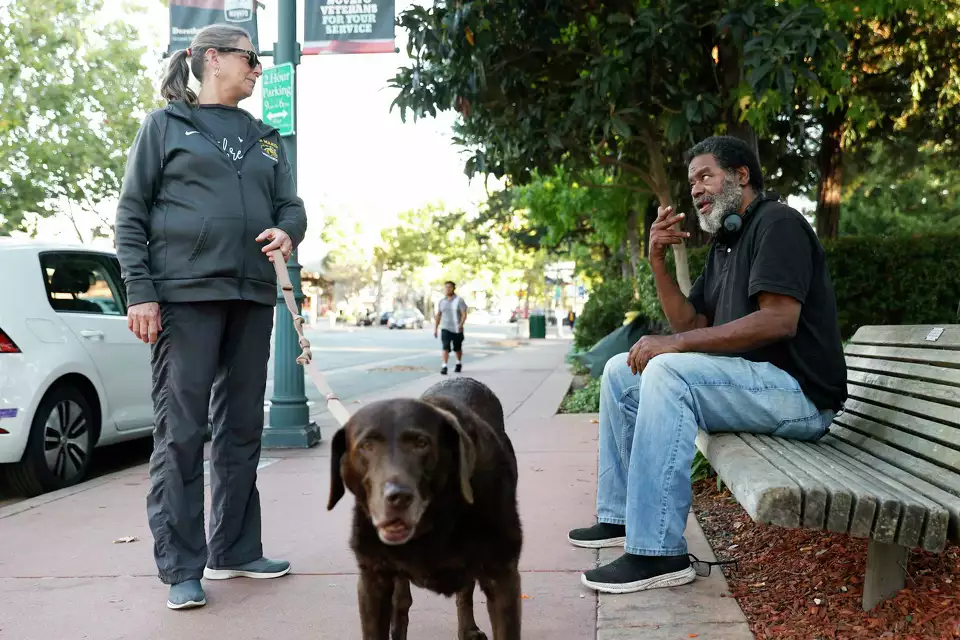After his wife died, Michael Sharpe fell behind on his rent. The Chronicle Season of Sharing Fund helped out within a week.
By Lily Janiak
 After his wife died, Michael Sharpe fell behind on his rent. The Chronicle Season of Sharing Fund helped out within a week of his applying. Jessica Christian/The Chronicle
After his wife died, Michael Sharpe fell behind on his rent. The Chronicle Season of Sharing Fund helped out within a week of his applying. Jessica Christian/The ChronicleAlmost a year after his wife died, Michael Sharpe still keeps her clothes in the drawers and closets of his small Novato apartment.
“I say to myself — a little internal dialogue, soliloquy — ‘How come you don’t close the doors, Mike, so you can’t see the clothes?’ But I know they’re there, so I just leave them open, and it’ll trigger some emotion,” he said. “I cry every day sometimes.
Though he’s 6 feet, 5 inches, and his wife, Kimberly Sharpe, was 5 feet, 4 inches, she kept him in line. She’d tell him she knew him better than he knew himself. When he’d press her, asking, “What am I thinking right now?” she’d respond, “I know, but I’m not going to tell you.” She might have a smirk, a hand on her hip, a shake to her head. That was Sharpe’s sign that he should “tread lightly,” he recalled with a bittersweet smile. But she could also be poetic. “She’d tell me, ‘If you throw a pebble in the ocean and you can find it, that’s when I stop loving you,’ ” he said.
When Kimberly first got diagnosed with uterine cancer, in 2020, she was still able to manage her small business, Frontline-Focus, which assists behavioral health care providers with patient intake. When the cancer went into remission, the couple felt confident enough in their finances for Sharpe, now 67, to retire from working for his wife’s company.
 Michael Sharpe holds pictures of himself and his late wife, Kimberly Sharpe, at his home in Novato. Jessica Christian/The Chronicle
Michael Sharpe holds pictures of himself and his late wife, Kimberly Sharpe, at his home in Novato. Jessica Christian/The Chronicle
But in June 2021, the cancer returned. “It was vicious,” Sharpe recalled. Over the next year, the business suffered, losing a significant client. By the time Kimberly died, in October 2022, Sharpe was behind on rent.
That’s where social service agency Community Action Marin and, later, the Chronicle Season of Sharing Fund, a charitable endeavor launched in 1986 to prevent homelessness and bolster food banks in the nine Bay Area counties, came in.
Chris Miranda, Sharpe’s caseworker with Community Action Marin, said the Season of Sharing Fund covered two months of his rent. The funds came through within a week of applying.
Older adults, Miranda pointed out, are particularly vulnerable in times of financial hardship. “Seniors that want to get back to work to be able to supplement their income aren’t able to as easily as someone that may be a lot younger than them,” Miranda said. Employers frequently prefer younger candidates.
 Michael Sharpe heads out for his daily walk to a bench in Novato where he and his late wife, Kimberly Sharpe, used to watch the Fourth of July parade. Jessica Christian/The Chronicle
Michael Sharpe heads out for his daily walk to a bench in Novato where he and his late wife, Kimberly Sharpe, used to watch the Fourth of July parade. Jessica Christian/The Chronicle
Sharpe had worked for 20 years in manufacturing, at Beckman Instruments, now known as Beckman Coulter Inc., in Palo Alto, and he was accustomed to taking care of himself and his four children — not asking others for help.
“There’s a thing about dignity,” he said. “Dignity’s this inner sense of value and worth, and I really grappled with that.”
The Season of Sharing Fund gave Sharpe a small cushion so he could apply for more benefits, on top of the Social Security he was getting. “He was able to clear his head, breathe and focus on what comes next,” Miranda said.
Grieving his wife while dealing with his own physical and mental health issues was hard enough, Sharpe said. If he’d lost his home, trying to do all that in a tent or shelter would be “a death sentence.”
Now Sharpe is figuring out how to live alone for the first time in more than four decades. His new routines are empty simulacra of the old ones.

Michael Sharpe talks with a passerby from the bench in Novato where he and his late wife used to watch the Fourth of July parade. Jessica Christian/The Chronicle
“Your expected, normal rituals and routines are turned upside down. That’s what existentialists call absurd,” he said.
But he is writing a book about the civil rights leader and theologian Howard Washington Thurman, inspired by Sharpe’s studies at the San Francisco Theological Seminary at the University of Redlands Graduate School of Theology in San Anselmo. Sharpe entered grad school at age 49 — a move for which he credits his wife. Finishing the book is one way of honoring her memory.
In the meantime, while his children find it emotionally difficult to visit the apartment where their mother died, his neighbors have pitched in. One, who owns a cleaning business, twice cleaned his apartment for free. Another lets him use a truck for emergencies, after Sharpe couldn’t afford car payments of his own.
“It is the divinity showing up by disguise,” Sharpe said. “If I get sick, I can’t heal my damn self, can I?” he went on. “We literally, according to the law of physics, need others.”

